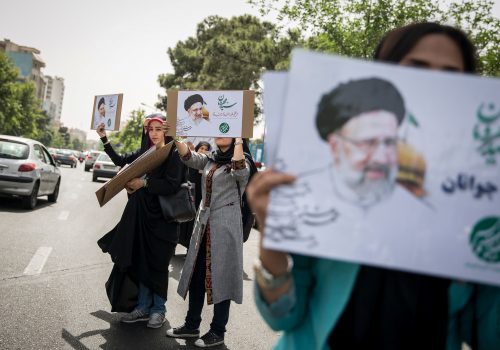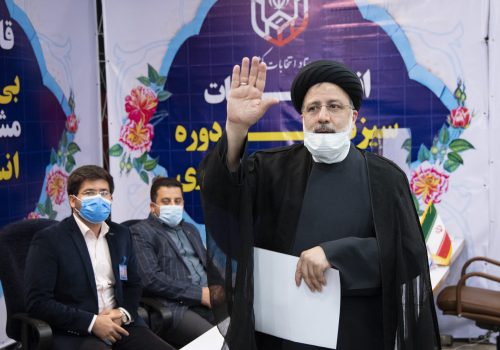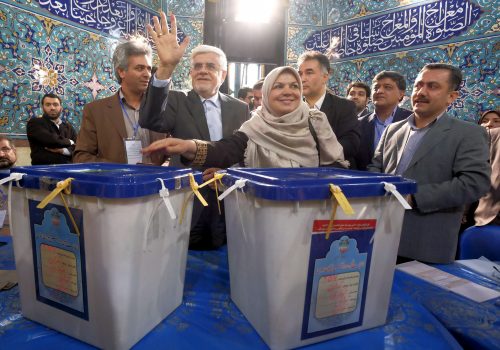Supreme Leader directly intervenes in Iran’s June vote
The Guardian Council, a twelve-member body tasked with vetting election candidates, announced on May 5 that it was amending its criteria for those running for president. Among the changes: candidates must be between forty and seventy-five years old at the date of registration. That effectively disqualifies Minister of Information and Communications Technology, Mohammad-Javad Azari Jahromi, who turns forty a month after the June 18 vote.
This is the third move in less than a month either directly by Supreme Leader Ayatollah Ali Khamenei or by his hand-picked Guardian Council to intervene in the election in favor of the hardliner camp.
On April 10, Khamenei told a grandson of Ayatollah Ruhollah Khomeini, the late leader of the 1979 revolution, that he should not run. Hassan Khomeini, who had already chosen a well-known revolutionary catchphrase of his grandfather—”All of us together”—as his campaign slogan, had perhaps the best potential to increase turnout in the election and provide a victory to the embattled reformist-pragmatist camp.
With Khomeini out of the game, this faction convened in late April to choose alternative candidates. Among the fourteen people it chose were Foreign Minister Mohammad Javad Zarif, who topped the list with thirty-seven votes, current First Vice President Eshaq Jahangiri with thirty-five votes, and Mostafa Tajzadeh, a former top aide to President Mohammad Khatami who was jailed for seven years after 2009 protests against election fraud, with thirty-two votes.
On May 2, the Supreme Leader gave a major televised speech on the occasion of Labor Day and Teachers Day that focused not on workers nor teachers but on criticizing Zarif and Tajzadeh. Khamenei praised the late leader of the Islamic Revolutionary Guard Corps (IRGC) Quds Force, Qasem Soleimani, and excoriated Zarif for leaked comments criticizing Soleimani’s control over Iran’s foreign policy and subordination of diplomacy to military intervention. The comments were given in an over three-hour long interview meant for the history books. Zarif publicly apologized twice for his remarks, including to the Supreme Leader for “hurting his feelings,” but the damage was done.
In the same speech, Khamenei undercut Tajzadeh as “a person that does not know the country and its constitution.” A former deputy minister in thec 1980s and 1990s, Tajzadeh has gradually turned from a regime insider to critic, dissident, and now vocal opponent of the system. He is one of the few dissidents inside Iran who has not shied away from directly criticizing the Supreme Leader. Announcing his intention to register as a presidential candidate, he posted his platform on his Instagram page, calling for accountability for the Supreme Leader; revising the constitution to limit the Supreme Leader’s term in office; pushing the IRGC out of the social, political, and economic domains and back to the garrison; and trying to “be the voice of the deprived people and the people suppressed in the November 2019 and January 2018 protests, the victims of the Ukrainian airplane shooting catastrophe, and all the deprived people that have been the victims of wrong approaches and policies of the establishment.” Tajzadeh also called fornormalization of relations with the United States.
Political realists know that the Guardian Council will reject Tajzadeh’s candidacy. But Tajzadeh is still seeking to expand the discourse of the campaign to include the real issues facing Iranian society. He hopes to prompt other candidates and even the Supreme Leader himself to address these concerns and offer potential solutions.
However, Khamenei is clearly not taking any chances. It appears that he has already decided that a hardliner should win the election at whatever cost by personally intervening to remove or discredit the reformist-pragmatists with the biggest vote-getting potential. As a result, that camp is left with people such as Jahangiri, who does not really want to run, the chairman of the Tehran city council Mohammad Hashemi, a son of the late President Hashemi Rafsanjani who is unlikely to attract many votes, and the former speaker of the parliament, Ali Larijani, who has the credentials but not the charisma to win, and who, in any case, has not yet received Khamenei’s approval to run for president.
The hardliners and Khamenei have several reasons to interfere so brazenly in the election. One is that their own camp is in disarray. Forty-five days before the election and only days before candidates’ registration is to begin, it is still unclear which members of the camp will seek to run. The Judiciary Chief Ebrahim Raisi appears to be the most promising candidate because he ran before and got more than fifteen million votes in the 2017 elections. Yet, so far, he has not received a nod from Khamenei. Saeed Jalili, Khamenei’s representative on the Supreme National Security Council and a member of the Expediency Council that resolves disputes among government branches, has conditioned his candidacy on Raisi not running. The parliament speaker and former Tehran mayor, Mohammad Baqer Qalibaf is also waiting to see if Raisi will run before registering and trying to fulfill a sixteen-year ambition of becoming president. There are other less well-known figures who are likely to register if Raisi does not step forward.
In short, Khamenei’s interventions might have helped the hardliners camp eliminate its strongest competition but he definitely has not been able to resolve the big differences and gaps inside his own camp to bring its top figures into agreement on a single candidate.
The author, who is well versed in the Iranian political scene, asked to remain anonymous.
Subscribe for more from IranSource
Sign up for the IranSource newsletter, which provides a holistic look at Iran’s internal dynamics, global and regional policies, and posture through unique analysis of current events and long-term, strategic issues related to Iran.
Image: FILE PHOTO: Iranian Supreme Leader Ayatollah Ali Khamenei delivers a televised speech in Tehran, Iran, January 8, 2021. Official Khamenei Website/Handout via REUTERS ATTENTION/File Photo



